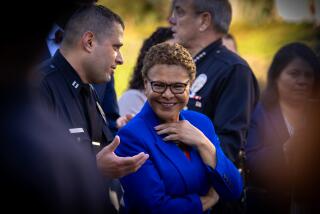Ex-Chief Refuses to Discuss Rampart
- Share via
As members of a special blue-ribbon panel begin to assess the Los Angeles Police Department’s handling of the Rampart corruption scandal, they’ll be forced to do so without the cooperation of one particularly important figure: former Police Chief Bernard C. Parks.
Parks, now a Los Angeles city councilman, has refused to meet with members of the Blue Ribbon Rampart Review Panel, which is headed by civil rights attorney Connie Rice and includes other lawyers and academics.
Bernard Parks Jr., the councilman’s son and director of communications, would not discuss his father’s reasons for not cooperating with the probe.
“It is what it is,” he said.
Rice and other members of the panel were openly critical of the department’s handling of the Rampart investigation when Parks was chief. In a recent interview, Rice said Parks is one of “several critical LAPD officials” whom the panel wants to interview. She said she would be disappointed if Parks doesn’t cooperate, but vowed that the probe would go forward with or without his input.
“Anyone who doesn’t want to talk doesn’t have to talk,” she said.
While still chief of the LAPD, Parks promised to produce a report detailing “the exact nature and disposition of each allegation” that surfaced during the Rampart probe. He initially said that the “after-action report” would be presented to the public by early 2001. But the document was still in the works when the chief was forced out of office more than a year later.
When a draft version was submitted to Chief William J. Bratton earlier this year, Bratton deemed the report “totally inadequate” and, with members of the civilian Police Commission, called for an independent panel to do the job.
Among the issues the Rice panel is expected to probe is the extent to which detectives investigated the allegations of corrupt ex-Officer Rafael Perez, who -- in exchange for a lighter sentence on cocaine theft charges -- agreed to identify fellow officers who engaged in criminal conduct.
During his debriefings with detectives, Perez implicated scores of officers from the Rampart Division’s anti-gang unit, saying they routinely beat gang members, planted evidence on suspects, falsified reports and covered up unjustified shootings.
Though the investigation led to the prosecution of nine officers and forced the firing or resignation of more than a dozen others, both police and prosecutors now concede that they never got to the bottom of Perez’s allegations and that officers who they believed committed crimes remain on the job.
A Times investigation of the scandal found that feuding among top officials, cursory investigations by some detectives and a pervasive police “code of silence” all helped to undermine the Rampart probe.
Parks’ own silence on the matter, at least with regard to the blue-ribbon panel’s inquiry, was criticized by some community and city leaders.
“It’s disappointing that Parks has never shown a great interest in getting to the bottom of the scandal, and it appears that his lackadaisical attitude from the past is continuing today,” said Police Commissioner Rick Caruso.
“I question what he may be hiding that he does not want to meet with the panel,” he added.
Mayor James K. Hahn, while refusing to directly criticize Parks, said that “anybody who had any role at all in the criminal justice system during that time should cooperate” with the panel.
Police Commission President David Cunningham, who was the only member of the board to vote in favor of giving Parks a second five-year term as chief, declined to comment.
The blue-ribbon panel’s investigation is the latest in a series of inquiries into corruption in the Rampart Division or the LAPD’s handling of the ensuing scandal. Shortly after the scandal broke in September 1999, the LAPD produced a report documenting managerial shortcomings that one police official said “allowed corruption to flourish.” Following that were reports done by the LAPD’s inspector general and another at the request of the police union.
Rice said in a recent interview that she realizes the opportunity to prosecute Rampart-scandal crimes has long since passed under the statute of limitations, and that it’s highly unlikely there will be any new misconduct charges against officers.
Her goal, she said, is to piece together how the probe was conducted and to learn from any mistakes that may have occurred along the way.
More to Read
Sign up for Essential California
The most important California stories and recommendations in your inbox every morning.
You may occasionally receive promotional content from the Los Angeles Times.











